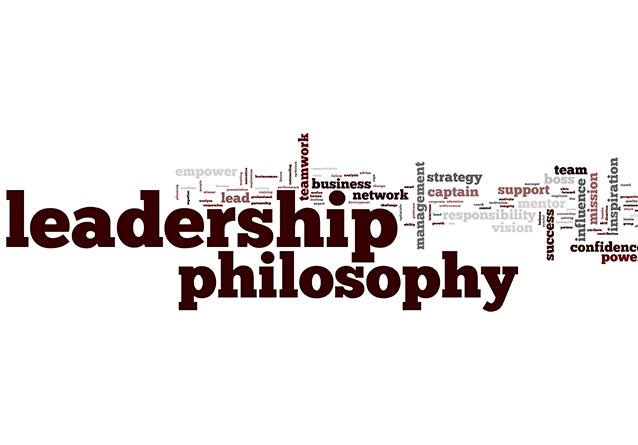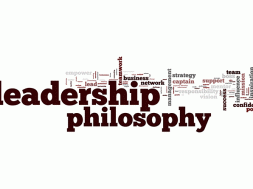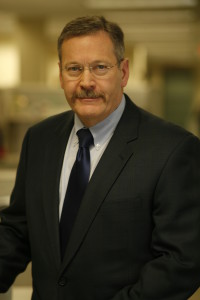
What is Your Leadership Philosophy?
By John King, Ed.D.
“A leader is best when people barely know he exists, when his work is done, his aim fulfilled, they will say: we did it ourselves.” – Lao Tzu
“Before you are a leader, success is all about growing yourself. When you become a leader, success is all about growing others.” – Jack Welch
Do you have a leadership philosophy? Your personal leadership philosophy should be the guideline that you espouse and follow as you lead your team in the operation of your organization.
There are many who say that there are born leaders. I prefer to think that leaders develop over time and are influenced by the people and situations they experience throughout their lives. Parents, teachers, scout leaders, coaches, employers, mentors and friends all influence an individual’s leadership philosophy and style. Being responsible for chores at home, early jobs like newspaper routes, responsibilities at school, student government, being a scout group leader, all give individuals the opportunity to experience and develop leadership skills. Early career jobs and working with supervisors and mentors help develop leadership direction for subsequent positions and leadership opportunities. In essence, we are working on our leadership philosophy throughout our lives.
Being a leader is a position of great responsibility. Not only are you responsible for the performance of your work teams, but you are also responsible for the development and support of those employees, so they are prepared and have the resources to appropriately perform those jobs.
To this end, the leader is responsible for employee performance from start to finish.
The start is the selection and training of the right employees. A bad hire is often the downfall of any work group. Not only does this cause performance problems, not to mention a negative influence on other employees, but you must document and terminate the poor performer in an appropriate and legal manner. This takes time. Then there is the time to hire and train a replacement. This may take from one to two years to recognize and rectify the problem resulting in much lost productivity. Leaders should take the time and actions to ensure that they hire the right individuals and make sure that they are trained in the exact manner that you expect the work to be conducted and to the standard that they demand.
Leaders must also ensure that their employees have all of the resources necessary to adequately and appropriately perform the job. Organizations are always conservative and conscientious about budgeting resources. The effective leader is skilled at budgeting and utilizing resources to best perform the job and achieve desired results. I have rarely seen an organization that gives you more than what you need, so an effective leader teaches and empowers his or her employees how to effectively utilize resources to reach their production goals.
This brings me to another important responsibility of a leader. A leader must be a teacher and a mentor to his or her employees. Quite often, the leader has the knowledge, skills and experience to perform the employee’s job much quicker and effectively than the employee themselves. The leader was not hired, however, to perform the work but rather to supervise others in the performance of the job. It is in the leader’s best interest to pass the skills and knowledge they possess on to their employees. The better the employee performs and the more that they learn, the more successful the organization will be. Employees also respond better to encouragement than they do to criticism. As a mentor, the leader can provide the employee with guidance, and encouragement as he or she helps them grow into better and more successful employees.
The leader at times also needs to be a disciplinarian and at all time the one accountable for the overall performance of the work group. The old saying “the buck stops here” is true for the leader. Just as they need to be encouraging and complimentary of the employee when they do well, they need to point out to the employee when their performance or behavior is inadequate or inappropriate. They are responsible for administering discipline, instructing the employee in the correct behavior or performance of their job and ensuring that corrective action is achieved and maintained.
The leader is responsible for providing the entire work group with a clear vision, strategy and objective in the performance of the work group.
Regardless whether he or she is communicating their own, the organization’s, or a high up’s vision and strategy, it is their responsibility to ensure that the vision and strategy are properly communicated and followed. Ultimately, they will be held responsible for the results generated by how that vision and strategy is implemented. Therefore, it is important that their employees buy into that vision and strategy if it is to be achieved.
An effective leader must also be a change agent. The only constant in life is that it will change. Organizations change their objectives and strategies. Markets change and adjust. Employees come and go. If the leader is resistant to change so will be the work team. If the leader does not know how to effectively, efficiently and successfully manage the change process, the results may be chaotic and devastating to both the work team and the organization.
Employees look to and depend on their leaders to create and maintain an environment where they can safely and successfully perform their jobs. They want the leader to be honest, fair, helpful and supportive in their efforts. They expect that the workplace will be safe both physically and emotionally. They expect that the leader will be fair and equitable in the manner in which they assign work, manage the operation and reward the employee for their performance, including both salary and acknowledgement. They expect that the leader will help them develop as employees and workers not only in the performance of their jobs but in achieving the ability and opportunity to advance in their careers. They also expect that their leader will be supportive of them in their own personal efforts to navigate their work and personal lives.
Ultimately the leader is responsible for bringing out the passion, drive, creativity and energy of his or her employees. The best and easiest way to achieve this is by first exhibiting that passion, drive, creativity and energy yourself. Work teams take their cues from their leaders who set the tone for the entire group. Passion, creativity and energy are contagious and where the leader enthuses these elements, the team usually follows suit. However, you want your work team to operate, make sure you are doing it yourself.
My philosophy of leadership is one that has evolved over time through education, experience, opportunity, mistakes and corrections, and mentoring by successful leaders.
In order to be successful, I believe a leader must possess and exemplify a number of attributes:
- Vision – it must be clear, realistic and attainable. Leaders must understand the marketplace, his or her constituents, and a vision of the future to come.
- Ability to listen and provide feedback – Leaders must listen to his or her stakeholders and provide honest feedback to their concerns, questions and opinions.
- Change agent – Life and organizations do not prosper without change. Leaders must understand the system of change and be willing to be a facilitator and promoter of ongoing organizational change.
- Strategic – Organizational change does not occur without a plan of action. Effective leaders are strategic thinkers understanding goal setting and strategic planning to achieve those goals.
- Willingness to take calculated risks – Organizations do not move forward without taking risks and leaders must be able to weigh the pros and cons of any action and willing to act judiciously for the benefit of the organization and its stakeholders.
- Accountable – Leaders must be willing to hold themselves and the organization accountable for their actions and the results of those actions.
- Honesty, trust and loyalty – If a leader expects to be followed his or her followers must be able to trust that the leader is telling them the truth and will be loyal to them in his or her efforts.
- Teaching and learning – It is the responsibility of a leader to develop the people who work within the organization. Effective leaders create environments where all can continue to learn, develop and grow to enhance their professional and personal lives. A leader must also be inquisitive and continue to learn and develop him or herself.
- Passion and energy – Passion and energy are infectious. Good leaders infect their organizations with both.
My leadership goal in developing teams has been to hire the best people possible, support and empower them to do the job, reward them often, and provide them with a vision and a plan and means to achieve that collective goal. I believe in my leadership experience I have achieved that goal. The work teams I have had the honor to develop and lead have been successful in their operation and results. I have tried to empower my employees to use their talents and creativity to develop innovative and successful programs and strategies that have resulted in benefit for both the organization and its stakeholders. Most of my employees have grown to accept positions of greater responsibility and personal reward, and many now have developed and lead their own work teams.
I now go back to my original question I used to open this article… Do you have a leadership philosophy? If you do, you may want to make sure it is set down on paper and pass this information along to your employees. You may also want to evaluate if this philosophy is empowering your work team to achieve the organization’s, your and their goals. If you do not have a leadership philosophy, perhaps it is time to develop and implement one. In either event, good luck in your leadership efforts and much success for you and your work team.
DR. JOHN KING is a seasoned professional dedicated to providing strategic services for organizations seeking improved operational effectiveness and growth through change or strategic direction. Dr. King can be best described as an educator, entrepreneur, futurist, innovator, marketer, strategist and leader. John King is an independent strategic consultant based in Naples, Florida. Throughout his career, John has been focused on bring innovation and forward thinking to the organizations and institutions with which he has been associated, most recently as Senior Vice President and Chief Academic Officer at Lincoln Educational Services. In addition to serving as SVP and Chief Academic Officer of Lincoln Educational Services Inc., he has served as Senior Vice President of Academic Affairs at Career Education Corporation, Provost & Vice President of Academic Affairs at Brown College in Minnesota, and Dean of Business & General Education at St. Paul Community & Technical College. John has also been both a full-time and adjunct instructor at the undergraduate and graduate level.
Prior to entering education in 1988, John worked in Marketing and Communications with such firms as Campbell-Mithun Advertising in Minneapolis, Tec Trans International Inc. in Minneapolis and Allied Stores Marketing Corporation in New York. John also operated his own consulting firm for 10 years and was a partner in The Creative Edge and Bijou, commercial and corporate video production companies.
Dr. King has served as chair or trustee for various colleges including Lincoln College of New England, Lincoln College of Technology – Columbia, MD, and McIntosh College in New Hampshire. John has also served on the Dakota County (Minnesota) Private Industry Council, the Eagan, Minnesota Economic Development Commission, the Small Business Management Program Advisory Committee of Dakota County Technical and Community College, the Employee Assistance Program Advisory Board of Family Service of Greater Saint Paul, and the Small Business Publicity Committee of the Minneapolis Chamber of Commerce. John was also on the Board of Directors of the Twin Cities Marathon.
In 2010 Dr. King was featured in the cover story “Who Influenced Education This Year” in Career College Central Magazine.
John earned a BA in Economics at St. Bernard College, a Masters in Education from the University of Minnesota and a Doctorate in Educational Leadership from the University of St. Thomas.
Contact Information: Dr. John King // Independent Education Consultant // 862-438-7039 // King0558@verizon.net











